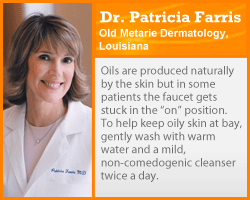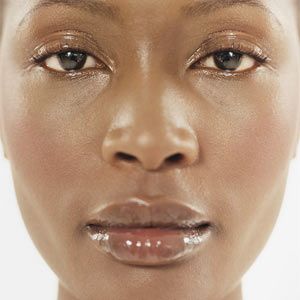You have more oil glands in your T-zone -- the area that extends across your forehead, down your nose and includes your chin -- than in other places on your body. If your skin is oily, you'll notice a sheen, occasional blemishes and even full blown acne in these areas. It's easy to think of the oil produced by your skin as the enemy, but you'd be in much worse shape without it. It helps to keep your skin protected from the elements and is important for maintaining a healthy acid balance, a pH range that keeps most types of damaging bacteria under control. When you produce too much of a good thing, though, there may be a combination of factors involved:
- Heredity - If your parents or siblings have had problems with oily skin, you probably will, too. The amount of sebum secreted by your oil glands is a factor of heredity. The mechanism at work is a hormone called dihydrotestosterone (DHT) that your body produces naturally. Too much DHT, and your skin will have difficulty handling the excess.
- Puberty - Increased levels of DHT and other hormones occur in both boys and girls during puberty and may continue into early adulthood. Your bouts with oily skin will become less frequent as you get older, and even though this may seem like cold comfort now, at least you're not suffering alone. Skin problems in teenagers are very common, and there are some effective treatments we'll get to in a minute.
- Diet - It can be reassuring to think if you lay off french fries for a couple of weeks, your discipline will lead to a glowing, smooth complexion. Unfortunately, it doesn't work that way. There isn't much support for the notion that a diet high in greasy foods leads to oily skin. Controlling your fat and sugar intake and eating lots of vegetables is good for whole body health, though, which will have a favorable impact on the health of your skin over time, but maybe not in the area of reducing oiliness and blemishes.
- Cleanliness - Keeping your skin clean is important, but it may be more challenging than you realize. If you have oily skin that's dirty, too, you're asking for more trouble than your poor face can handle. On the other hand, if you use harsh cleansers that disturb the protective acid mantle on your skin, you're doing yourself more harm than good. You could increase levels of bacteria that might lead to infection, or cause redness, flaking skin, dry patches or roughness -- all without solving the problem. You could also cause enough of a disturbance to encourage your skin to start producing even more oil in response. The trick is to find products that help clean your skin without exacerbating existing problems or causing new ones.
Although the items listed above are biggies when it comes to causing oily skin, there may be other contributing factors, too. You skin is the largest organ in your body -- well, on your body. It's affected by almost everything you do. Sun exposure, stress, smoking, drinking and not getting enough sleep may all contribute to oily skin problems. Before you decide you can't have nice skin and a normal life, too, consider moderation and a common sense approach to skin care. Wear sunscreen, clean your skin regularly with a mild cleanser and explore some products and approaches that will remove excess oil gently.


